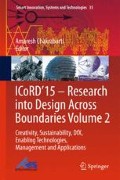Abstract
Design of engineering systems requires understanding of physical behavior. Previously, design intuition was considered to be developed based on actual experience. However, use of simulations to understand physical behavior is now widespread, and can play a role in developing design intuition rapidly. It can be said that design intuition is essentially a cognitive model in a qualitative form and is descriptive. Research indicates that these cognitive models have a structure, are decomposable and runnable and combine with memories in the mind. In this paper, it is argued simulations help the evolution of the cognitive models, using a predict, test and validate (PTV) approach aided by visualization and imagery. Using case studies, it is seen that while some naïve intuitive models are consistent with physical laws, in other cases, the faulty models are replaced with models that have basis in physical laws when using the PTV approach. Thus, simulations appear to enrich cognitive models of physical behavior, aid design synthesis within a design space. It is seen that simulation enriched design intuition evolves rapidly and can be used effectively in training.
Access this chapter
Tax calculation will be finalised at checkout
Purchases are for personal use only
References
Johnson-Laird, P.N.: Mental Models. Towards a Cognitive Science of Language, Inference, and Consciousness. Cambridge University Press, Cambridge (1983)
Gentner, D., Stevens, A.L.: Mental Models. Lawrence Erlbaum Associates, Hillsdale (1983)
DiSessa, A.A.: Phenomenology and the evolution of intuition. In: Gentner, D., Stevens, A.L. (eds.) Mental Models, pp. 15–34. Lawrence Erlbaum Associates, Hillsdale (1983)
McCloskey, M.: Intuitive physics. Sci. Am. 248(4), 122–130 (1983)
Williams, M.D., Hollan, J.D., Stevens, A.L.: Human reasoning about a simple physical system. In: Gentner, D., Stevens, A.L. (eds.) Mental Models, pp. 131–154. Lawrence Erlbaum Associates, Hillsdale (1983)
Staggers, N., Norcio, A.F.: Mental models: concepts for human computer interaction research. Int. J. Man Mach. Stud. 38, 587–605 (1993)
Chandra, S., Blockley, D.I.: Cognitive and computer models of physical systems. Int. J. Hum. Comput. Stud. 43, 539–559 (1995)
de Kleer, J., Brown, J.S.: A framework for qualitative physics. In: Proceedings of the Sixth Annual Conference of the Cognitive Science Society, pp. 11–18 (1984)
Kupiers, B.: Commonsense reasoning about causality: deriving behaviour, from structure. Artif. Intell. 24, 169–203 (1984)
Forbus, K., Gentner, D.: Qualitative mental models: simulations or memories. In: Eleventh International Workshop on Qualitative Reasoning, Cortona, Italy (1997)
Forbus, K.: Qualitative modeling. WIRES: Cogn. Sci. 2(4), 374–391 (2011)
Chandra, S.: The structure of a physical behaviour description facility. Artif. Intell. Eng. 13, 91–103 (1999)
Hamrick, J.B., Battaglia, P.W., Tenenbaum, J.B.: Internal physics models guide probabilistic judgments about object dynamics. In: Carlson, L., Holscher, C., Shipley, T. (eds.) Proceedings of the 33rd Annual Conference of the Cognitive Science Society, Austin, TX (2011)
Tenenbaum, J.B., Kemp, C., Griffiths, T.L., Goodman, N.D.: How to grow a mind: statistics, structure, and abstraction. Science 331(6022), 1279–1285 (2011)
Battaglia, P.W., Hamrick, J.B., Tenenbaum, J.B.: Simulation as an engine of physical scene understanding. Proc. Natl. Acad. Sci. 110(45), 18327–18332 (2013)
Trafton, J.G., Kirschenbaum, S.S., Tsui, T.L., Miyamoto, R.T., Ballas, J.A., Raymond, P.D.: Turning pictures into numbers: extracting and generating information from complex visualizations. Int. J. Hum. Comput. Stud. 53(5), 827–850 (2000)
Sanborn, A.N, Mansinghka, V.K, Griffiths, T.L.: Reconciling intuitive physics and Newtonian mechanics for colliding objects. Psychol. Rev. 120(2), 411–437 (2013)
Author information
Authors and Affiliations
Corresponding author
Editor information
Editors and Affiliations
Rights and permissions
Copyright information
© 2015 Springer India
About this paper
Cite this paper
Chandra, S. (2015). Evolution of Design Intuition and Synthesis Using Simulation Enriched Qualitative Cognitive Models. In: Chakrabarti, A. (eds) ICoRD’15 – Research into Design Across Boundaries Volume 2. Smart Innovation, Systems and Technologies, vol 35. Springer, New Delhi. https://doi.org/10.1007/978-81-322-2229-3_1
Download citation
DOI: https://doi.org/10.1007/978-81-322-2229-3_1
Published:
Publisher Name: Springer, New Delhi
Print ISBN: 978-81-322-2228-6
Online ISBN: 978-81-322-2229-3
eBook Packages: EngineeringEngineering (R0)

